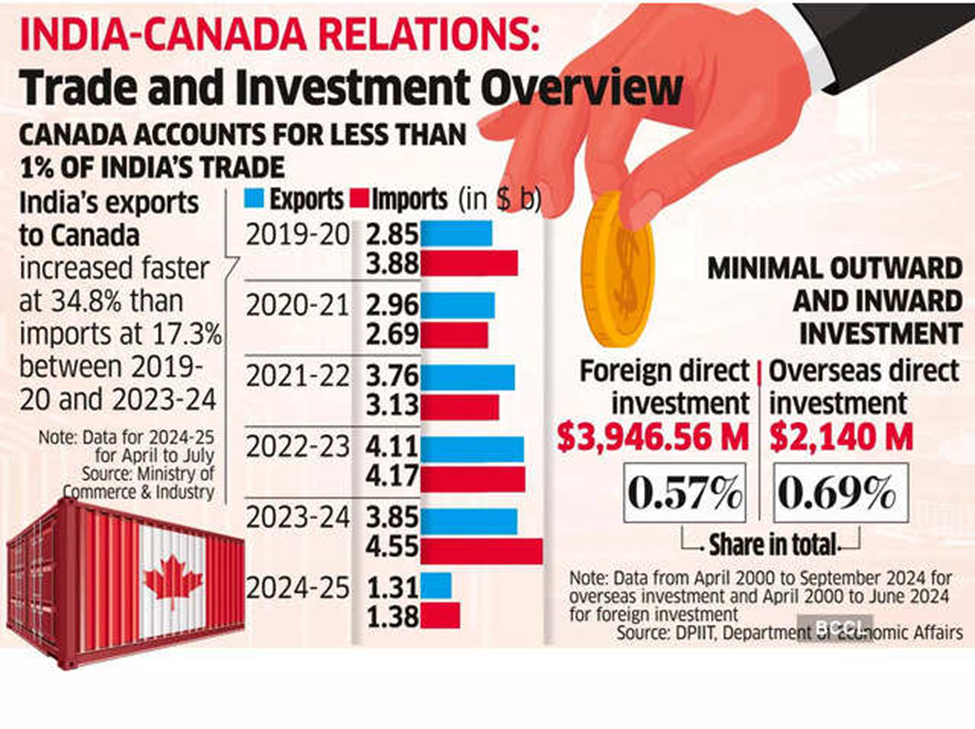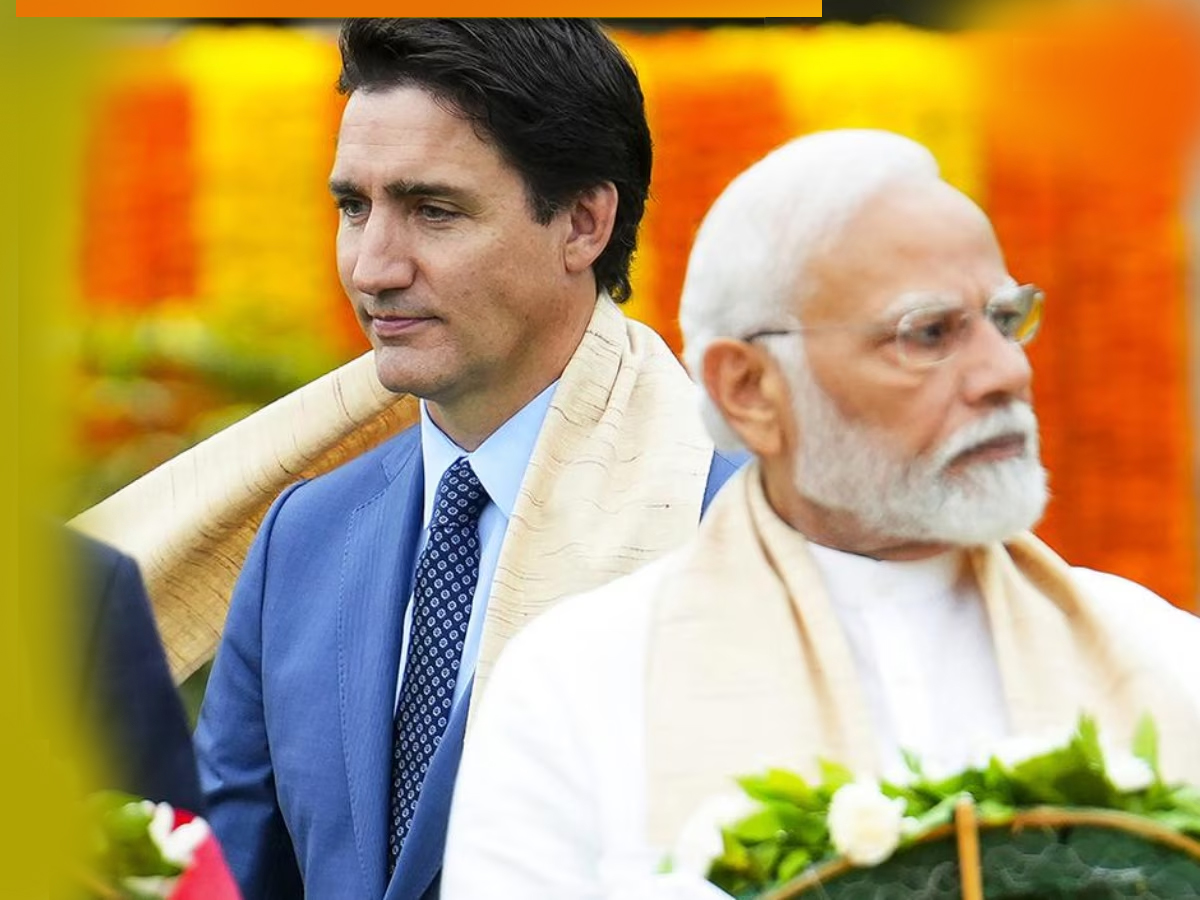Indo-Canada relations have reached a new low amid ongoing bilateral disagreements, culminating in India’s recent expulsion of six Canadian diplomats. This decision follows India's recall of its own diplomats from Canada, with all diplomats required to leave by 11:59 PM on Saturday, October 19, 2024. The tensions escalated after Canadian Prime Minister Justin Trudeau alleged Indian involvement in the murder of pro-Khalistan activist Hardeep Singh Nijjar. Canada has labeled the Indian High Commissioner and other diplomats as “persons of interest” in this investigation.
- The Ministry of External Affairs (MEA) of India has categorically rejected these allegations, attributing them to the political agenda of the Trudeau government, which it claims is centered around vote bank politics.
- This strained relationship is not new; it has soured over the past four to five years due to India’s concerns regarding Canada’s leniency toward Khalistani separatists, designated as a terrorist organization by India in 2020.
Background of India-Canada Relations:
1. Historical and Diplomatic Relations:
o Diplomatic relations between India and Canada were established in 1947 and elevated to a strategic partnership during Prime Minister Narendra Modi’s visit to Canada in 2015. However, ties have since soured due to Canada’s perceived leniency towards pro-Khalistani elements, which India considers terrorist organizations.
2. Commercial Relations:
o India was Canada’s 10th largest trading partner in 2022-23, with bilateral trade amounting to USD 8.15 billion.
o India’s exports to Canada stood at USD 4.10 billion, while imports from Canada reached USD 4.05 billion in 2022-23.
o Both countries had been negotiating a Comprehensive Economic Partnership Agreement (CEPA) and an interim Early Progress Trade Agreement (EPTA) to enhance trade relations. However, these talks were paused in September 2023 following the diplomatic row over Nijjar's murder.
3. Nuclear Cooperation:
o Canada played a crucial role in India’s nuclear energy program since 1956, including the construction of India’s first research reactor, CIRUS. Relations took a hit after India’s 1974 nuclear tests but were restored with the Nuclear Cooperation Agreement (NCA) signed in 2010.
4. People-to-People Ties:
o Canada hosts one of the largest Indian diasporas, with approximately 1.6 million people of Indian origin, accounting for 4% of Canada’s population. Indian-origin politicians hold 22 seats in the Canadian Parliament.

Key Challenges in India-Canada Relations:
1. Khalistani Separatist Movements:
o India has repeatedly accused Canada of providing a safe haven for separatist Khalistani groups, which New Delhi views as a threat to its sovereignty. Jagmeet Singh, leader of the New Democratic Party (NDP) and a political ally of Trudeau’s government, has been a prominent figure in this controversy.
o The Khalistan referendum held by separatist groups in Canada in 2022 further strained relations, with India strongly objecting to the support provided by Canada to these groups.
2. Canadian Inaction on Anti-India Elements:
o India has consistently criticized Canada’s slow action against anti-India elements operating from Canadian soil. A major controversy arose in June 2023 when a parade float in Canada depicted the assassination of Indian Prime Minister Indira Gandhi, an act allegedly celebrated by pro-Khalistani groups.
o This incident, along with ongoing attacks on Indian-origin individuals, has deepened India’s concerns about Canada’s failure to curb anti-India activities.
Recent Diplomatic Escalation:
1. Death of Hardeep Singh Nijjar:
o Hardeep Singh Nijjar, leader of the Khalistan Tiger Force (KTF), was shot dead outside a gurdwara in Surrey in June 2023. India had placed a bounty of Rs 10 lakh on Nijjar, accusing him of terrorist activities, including conspiring to kill a Hindu priest in Punjab.
2. Diplomatic Actions and Responses:
o Following Nijjar's death, Canadian PM Trudeau raised the issue with Prime Minister Modi during the G20 Summit in September 2023 and demanded Indian cooperation in the investigation.
o Trudeau’s allegations led to the expulsion of diplomats by both countries and the eventual withdrawal of Indian diplomats from Canada in October 2024, citing security concerns.
3. Canada’s Evidence and Indian Rejection:
o Canada claims to have provided credible evidence linking Indian agents to the assassination, which India has dismissed as politically motivated. Canadian Foreign Minister Mélanie Joly stated that all options, including sanctions, are on the table if India does not cooperate with the investigation.
o Allegations have surfaced that Indian agents have been involved in criminal activities in Canada, collaborating with the Lawrence Bishnoi gang, known for its criminal network active in both India and Canada.
Impact on Indian Diaspora and Businesses:
- Diaspora Impact: The ongoing diplomatic tensions have raised concerns among the Indo-Canadian diaspora. The Indian community in Canada, which includes over 1 million Non-Resident Indians (NRIs), has been affected. There are concerns over visa restrictions for family-related events, like weddings and funerals.
- Economic Impact: Despite rising tensions, trade relations between India and Canada have remained stable so far. Bilateral merchandise trade grew from USD 8.3 billion in 2022-23 to USD 8.4 billion in 2023-24. However, experts warn that prolonged diplomatic hostilities may lead to adverse economic impacts if the situation escalates further.
International and Geopolitical Repercussions:
- Geopolitical Context:
- Canada has indicated that it may impose sanctions on India. Canadian Foreign Minister Mélanie Joly stated that "everything is on the table," hinting at possible diplomatic actions.
- Canada has sought support from its Five Eyes alliance (Australia, Canada, New Zealand, the UK, and the US) and G7 partners. However, the likelihood of these countries siding with Canada against India seems minimal, given India’s strong ties with many of these nations.
- India’s Global Role: India has been strengthening its presence on the global stage, being a member of major international organizations like BRICS and the Shanghai Cooperation Organisation (SCO). The escalating row may have repercussions at the upcoming G7 summit, where Canada has historically invited India as a guest to counterbalance its alliances with other multilateral organizations.
Conclusion:
The Indo-Canada diplomatic crisis has reached a critical stage, with both nations exchanging accusations and diplomatic expulsions. While economic relations remain stable for now, continued tensions could lead to broader repercussions, including economic fallout and geopolitical shifts. The resolution of this issue requires diplomatic dialogue, but with both sides holding firm positions, it remains to be seen how and when the relations will improve.
|
Probable questions for UPSC Mains exam: Critically examine the role of diaspora politics in influencing diplomatic relations between India and Canada. How have the Khalistan separatist movements in Canada impacted bilateral ties? |







